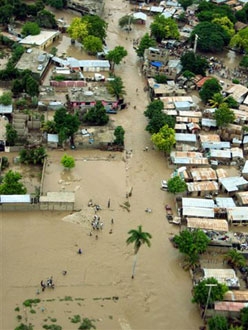The overall theme of the XXVIII School of Hydraulics is
Hydraulic Methods For Catastrophes: Floods, Droughts, Environmental Disasters.
We welcome submissions in all areas that may contribute to increase our knowledge in the description or prediction of extreme situations that we deal with in aquatic environment and where hydraulic methods offer important solutions.
|
Floods, for example are extremely complex geophysical processes and their analysis has been a growing field of research for many years. Understanding the fluid mechanics lying in the heart of floods and the ways of their control is of great economic and ecological importance. Floods trigger cascades of physical processes that alter streams and riparian zones and can be treated as large natural disturbances. Various catastrophic floods that occurred in different places in the world (among them in Poland) clearly expose the strength and weakness of the existing flood management and hazard response systems. It is obvious that further research is needed for gaining a better insight into the role of reservoirs and hydraulic structures in flood control and the development of optimal flood management strategies. Predicting current and future flood risk continues to be a major challenge for hydraulicans. Flood risk predictions are characterised by considerable uncertainty that definitely should be addressed during the meeting. The major topics that might be covered during the School include: flood analysis and prediction, field data, hydraulics of flood flows, sediment transport and morphological effects, physical and numerical modelling, engineering design, maintenance and operation of schemes. Many other related topics could be considered and among them the dam break problem i.e. the sudden release of a given volume of fluid down a slope seems to be crucial for considerations during the meeting.
|


|
|
Other problems that will be discussed at the meeting are the ones related to the ecological catastrophes that might happen in water bodies. For example accidental spills happen all over the world and decision makers with the help of research community have to be prepared to mitigate their effects. Oil slicks, floating sewage debris, dead fish and unusual or unnatural water discolorations or smells are all indications of pollution problems and are encountered every year in many places. Very often we deal with less visible substances such as some toxin compounds and heavy metals and these require scientific sampling and analysis to determine their presence. A very important practical question is the origin of pollution and one should know whether it is coming from a discernable source, such as a point on shore or a particular discharge or does it appear to be coming from a undetermined upstream location. One of the tools that are needed to predict the behaviour of the released pollution are mathematical models. Understanding of the fate of soluble pollutants is therefore essential for the efficient management of the river environment. It is not only to deal with catastrophic situations that have already occurred but also for environmental assessment tasks and for the evaluation of potential threats to a water body under consideration. In principle the release of contaminants in water bodies poses questions concerning the regulation of pollution sources, the evaluation of risk due to accidental contaminant releases and the design of any effluent discharge system. Water quality models are essential for assessing the pollutant pressure due to changes in the river geochemistry and hydrograph caused by hydropower regulation, irrigation, forestry activity, agriculture and flood control. Papers discussing any of the above topics are specially encouraged to be presented during the School.
|


|
|
XXVIII School of Hydraulics, similarly to previous events, is intended to provide a forum for scientists and engineers working in the field of broadly understood hydraulics. By bringing together experts (academics and practitioners) as well as young scientists, we hope to create a very good atmosphere for scientific debate and learning and also to make this occasion an enjoyable experience for the participants.
|






